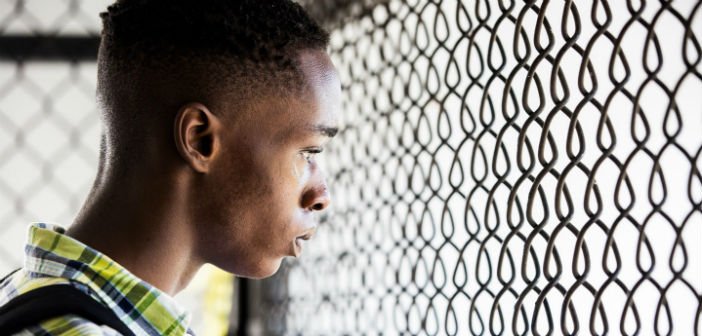Many films have explored the difficulties that adolescence presents for young people struggling with their sexuality, but this story has seldom been told with such a powerful feeling of relevance and immediacy as in Barry Jenkins’ Moonlight. Based on Tarell Alvin McCraney’s unproduced stage play In Moonlight Black Boys Look Blue, the film is divided into three distinct segments of our African-American protagonist’s life, with each titled after the names other characters use to address him.
In “Little,” he’s portrayed by Alex Hibbert and introduced as a wide-eyed and terrified 10-year-old fleeing through vacant lots with his classmates in hot pursuit, threatening to “kick his gay ass.” Little manages to find refuge in an abandoned housing tenement, where’s he’s discovered by Juan (Mahershala Ali), a Cuban-born drug dealer responsible for the neighborhood dope trade. While his chosen profession might have cast him as the villain in most films, Moonlight treats Juan with a level of honesty that would almost never be attempted in more mainstream fare. His home quickly becomes a safe haven for Little, with Juan and his girlfriend Teresa (Janelle Monáe) more than happy to serve the boy a meal or teach him to swim. These are good people, decent and compassionate, and the fact that Juan is simultaneously the most positive role model in the boy’s life and also responsible for Little’s mother Paula (Naomie Harris) spiraling into the throes of addiction is a tragically ironic and heartbreaking coincidence.

Picking up 6 years later, “Chiron” finds our subject (Ashton Sanders) as a quiet, socially awkward teenager. Paula is nearing rock bottom and the bullying at the hands of his classmates is becoming increasingly violent, but his problems seem to melt away after a chance meeting with his childhood friend Kevin (Jharrel Jerome). Sharing a spliff on a moonlit beach and gazing soulfully at each other, the tension grows to a fever pitch, with each young man hesitant to initiate the contact both are longing for. Chiron’s first sexual experience is handled with a sense of grace and delicacy, which creates a harsh juxtaposition with the violent encounter in Chiron’s future – one that will change his life forever.
We fast-forward nearly a decade for “Black,” and our hero (Trevante Rhodes) has not only embraced the nickname Kevin gave him as a teen, but has also moved to Atlanta and reinvented himself from the ground up. Long gone is the scrawny kid that could barely make eye contact with his peers, and in his place is a muscle-bound Adonis with gold-plated fronts and diamond earrings. Following in the footsteps of his mentor, Black has a devoted crew stationed on the neighborhood corners and kicking up a sizeable percentage of everything they sell, even while his mother is a resident at a local rehab center. But although his look and lifestyle might have given him an extra boost of confidence, Black’s old self comes rushing back after a surprise phone call from Kevin (Andre Holland), who bids him to return home for a visit.

Each of these segments could have offered more than enough material for their own standalone film, but the fact that we only spend a fraction of our time with Chiron during each of these formative periods in his life actually results in a much clearer picture of the unique challenges that come with being gay as an African-American male. Barry Jenkins has created a deeply moving portrait of characters that mainstream cineme has neglected for too long, and Moonlight is a bold commentary on masculinity, diversity and intimacy that will no doubt resonates strongly with any viewer – black, white or otherwise – who has ever grappled with acceptance of their own identity.
A haunting and heartbreaking tale of an African-American youth struggling with his sexuality, told in three separate vignettes that are equally moving and tragic, uplifting and devastating. Director Barry Jenkins has delivered a true masterpiece.
-
Score10

